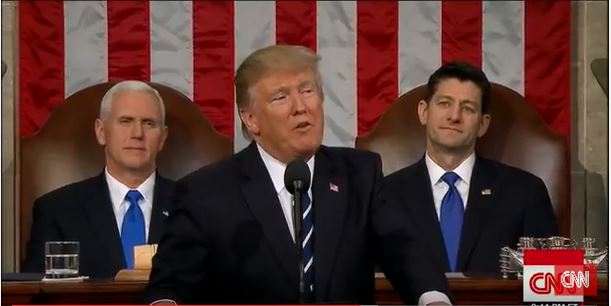Thanks Mr President, but you’re wrong about FDA, says rare disease group

President Trump used his first speech to Congress on Tuesday to herald a “renewal of the American spirit” and condemned racism and violence, striking a new more optimistic tone after a tumultuous and divisive first month in the White House.
Included in his speech’s wide-ranging agenda was a promise to speed up the FDA approval process, which Trump said was “slow and burdensome” – and which he claimed was keeping life-saving advances from US patients.
The speech coincided with worldwide Rare Disease Day, and he used the example of one rare disease patient, Megan Crowley, who was in the audience as an example of how new treatments could save lives.
Megan and her brother were diagnosed with Pompe disease as infants in the late 1990s, and were given just years to live. Their father John Crowley, frustrated by a lack of treatments for the disease, set about finding one himself, and personally led the research to develop the first Pompe disease drug, Myozyme. The drug was eventually launched by Genzyme after it acquired the biotech Novazyme, and was a pioneering rare disease treatment.
Trump used this example to call for a faster, leaner FDA process:
"If we slash the restraints, not just at the FDA but across our Government, then we will be blessed with far more miracles like Megan,” he said.
However commentators have been quick to question Trump’s claim that the FDA is holding back new breakthrough drugs – including former FDA commissioner David Kessler.
https://twitter.com/DavidAKesslerMD/status/836784557752008704
Most significantly, the National Organization for Rare Disorders (NORD), the influential US rare disease patient organization, politely but directly disagreed with the president – on almost every point.
While thanking the president for bringing attention to the issue, NORD said he was mistaken about the need for a radical cutting back of regulations.
"We agree that FDA review processes can be improved upon to expedite the development and review of orphan drugs. Yet we disagree with the President that restraints must be slashed, or that the approval process at the FDA is preventing advances from reaching those in need.”
NORD marshalled some convincing statistics to show that the FDA had reviewed rare disease drugs rapidly. It says that between 2008 and 2013, 87% of the 113 rare disease treatments reviewed by the FDA received an expedited review, compared to 35% of treatments for common diseases.
Meanwhile 78% of rare disease treatments were approved using one or more flexible development approaches (generally this means not demanding two adequate and well-controlled trials, or allowing novel endpoints).
NORD went on to stress that it believes the current safety and effectiveness standards for drugs and biologics are “crucial to ensuring individuals with rare diseases receive therapies that will positively impact their lives.”
It added: “Our patients deserve the same quality therapies as everyone else, and to weaken the standards will only threaten our population with unsafe, ineffective therapies.”
The most controversial FDA approval of 2016 was the green light for Sarepta’s Exondys 51, a treatment for Duchenne disease which hasn’t yet shown robust proof that it helps slow the disease.
The FDA approval included stipulations that the drug must eventually prove its clinical worth, but nevertheless, many observers felt the decision had been forced on FDA experts, thanks to pressure from patient groups eager to try any drug to halt the cruel progressive wasting disease.
NORD concluded by calling for three actions.
Firstly, it says the FDA must be allowed to hire and retain the experts needed to quickly and thoroughy review orphan drugs.The Center for Drug Evaluation and Research (CDER) has hundreds of unfilled positions, but President Trump has issued a freeze on recruitment across federal agencies.
Secondly, it called for the critical user fee agreements that help fund the FDA to be reauthorised in 2017.
Finally, it also calls for the Prescription Drug User Fee Act (PDUFA) and Medical Device User Fee Act (MDUFA) to be renewed, which also bring in funds and reforms to how the FDA operates.
All of these measures will require the president and Congress to agree on new funding for the FDA, something which remains in doubt. Federal budgets will come under extra pressure as Trump is calling for a massive increase in defense spending.
NORD emphasised its appreciation of President Trump's attention, and said it hoped to work with his administration to support the needs of its community, including the passage of these key user fee agreements.
Its sentiments are broadly shared by pharma and biotech companies, who believe that the FDA’s high standards give everyone confidence in approved products, and allows the best products to prevail over inferior ones.
The president is also yet to declare his nomination for the post of FDA Commissioner. Among the many candidates, Scott Gottlieb is the out-and-out favourite in industry circles, and is believed to possess the best balance between experience and understanding of the FDA as well as willingness to try new approaches and cut unnecessary obstacles.











